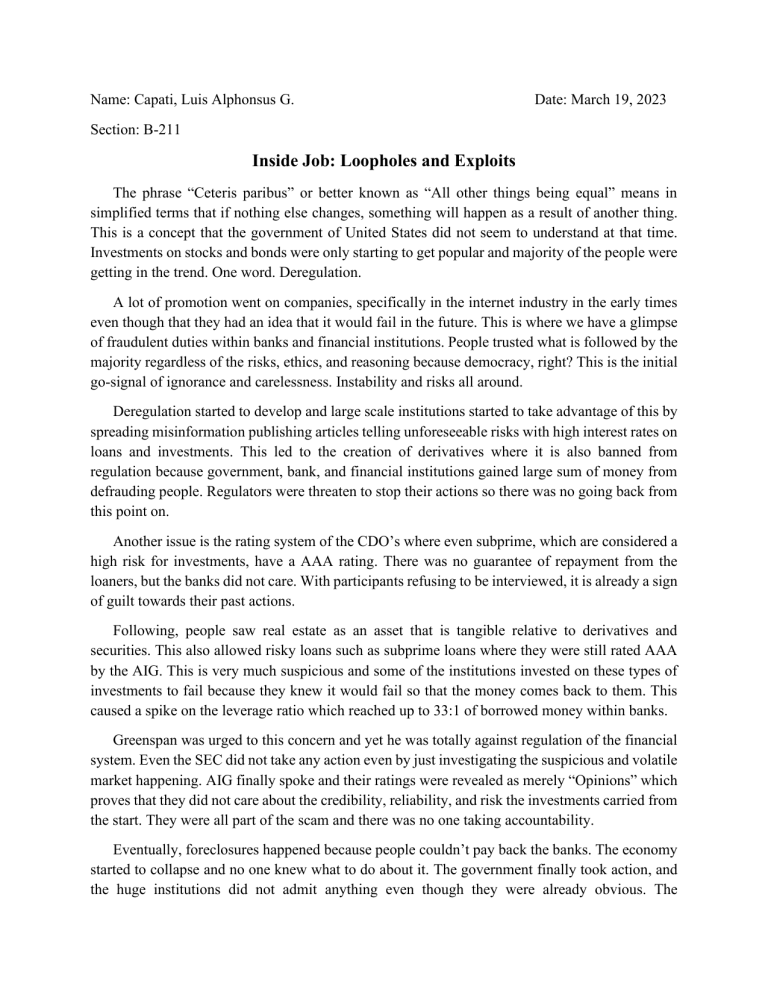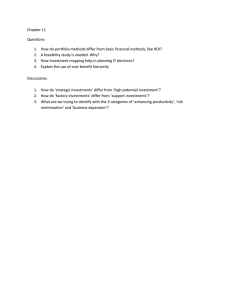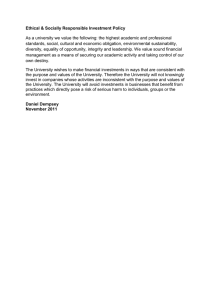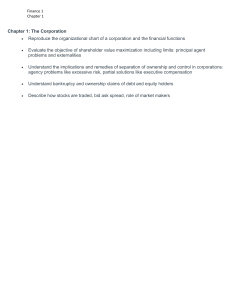Inside Job: Loopholes & Exploits - 2008 Financial Crisis Essay
advertisement

Name: Capati, Luis Alphonsus G. Date: March 19, 2023 Section: B-211 Inside Job: Loopholes and Exploits The phrase “Ceteris paribus” or better known as “All other things being equal” means in simplified terms that if nothing else changes, something will happen as a result of another thing. This is a concept that the government of United States did not seem to understand at that time. Investments on stocks and bonds were only starting to get popular and majority of the people were getting in the trend. One word. Deregulation. A lot of promotion went on companies, specifically in the internet industry in the early times even though that they had an idea that it would fail in the future. This is where we have a glimpse of fraudulent duties within banks and financial institutions. People trusted what is followed by the majority regardless of the risks, ethics, and reasoning because democracy, right? This is the initial go-signal of ignorance and carelessness. Instability and risks all around. Deregulation started to develop and large scale institutions started to take advantage of this by spreading misinformation publishing articles telling unforeseeable risks with high interest rates on loans and investments. This led to the creation of derivatives where it is also banned from regulation because government, bank, and financial institutions gained large sum of money from defrauding people. Regulators were threaten to stop their actions so there was no going back from this point on. Another issue is the rating system of the CDO’s where even subprime, which are considered a high risk for investments, have a AAA rating. There was no guarantee of repayment from the loaners, but the banks did not care. With participants refusing to be interviewed, it is already a sign of guilt towards their past actions. Following, people saw real estate as an asset that is tangible relative to derivatives and securities. This also allowed risky loans such as subprime loans where they were still rated AAA by the AIG. This is very much suspicious and some of the institutions invested on these types of investments to fail because they knew it would fail so that the money comes back to them. This caused a spike on the leverage ratio which reached up to 33:1 of borrowed money within banks. Greenspan was urged to this concern and yet he was totally against regulation of the financial system. Even the SEC did not take any action even by just investigating the suspicious and volatile market happening. AIG finally spoke and their ratings were revealed as merely “Opinions” which proves that they did not care about the credibility, reliability, and risk the investments carried from the start. They were all part of the scam and there was no one taking accountability. Eventually, foreclosures happened because people couldn’t pay back the banks. The economy started to collapse and no one knew what to do about it. The government finally took action, and the huge institutions did not admit anything even though they were already obvious. The consequences were exponential just as how rapid the economy bubbled. People had to start all over again to regain their assets. This led to where we are now where banks and financial institutions are heavily regulated to avoid financial crises such as that of 2009. The world learned from those mistakes and corruption so we have to be more aware of these subtle actions. If it sounds too good to be true, that’s because it is. The first lesson I learned here is greed can pull even harder on those who hold the most power which can create an unstoppable force. Eventually, chaos will happen and the ones truly deserving will end up accountable on insurmountable consequences. This also shows that there truly are no shortcuts in life and if you force to make them, you will only suffer in the end. You cannot beat a hardworking person and that is what I strive be. My second takeaway is that we should always think about the bigger picture, or the long-term effects. Short-term investments, whatever form it may be, ruins our reward system in our brains because we get used to instant gratification that it creates an imbalance in our minds. This is what happened to the wall street employees where earning money had the same reaction in their brain as doing drugs. For crises, there is always someone who will hold accountable whether it is their fault or not. We should keep this in mind such as the phrase from above “Ceteris paribus” as there is always an equal effect to what we do. When we reach this point, we cannot stop it so we have to go further back. The key here is that prevention is the proper practice so that we do not reach this point in the first place. This can be done through preparation, contingency planning, thorough observation, deep research, and study. We should not be blinded with the consequences of high rewards from its high risks. I have already mentioned accountability many times because these issues and solutions are interchangeable. My takeaway for accountability is that we should learn to take account of our actions because that ultimately teaches us the justice within this unjust world. It gives us the sense of order instead of unaligned reality because it disciplines our minds. In the case of the corrupt corporations, no one wanted to take account of the deficits which therefore was transposed to the innocent citizens. For my last takeaway, we should learn from our mistakes and minimize the repetition of them as much as we can because we can only move forward and gain a new perspective. We can only do so much so we should do the best we can as early as now so that we do not suffer later on. The most important thing of all, we should reflect on our actions whatever they may be. Contemplation is the most powerful tool for learning as we observe ourselves and understand the world much better from there on. It may seem to stray away from the topic but it is my life learnings which I see applicable anywhere and whoever. Failure, may it be microscopic or enormous in scale, should have a takeaway as it is what gives it meaning and value more than success does to us. By understanding this, we may see failure as a stepping stone rather than a collapse as we learn something from it. With that, I would like to conclude my thoughts with a quotation from the author Paulo Coelho “The secret of life, though, is to fall seven times and to get up eight times.”




